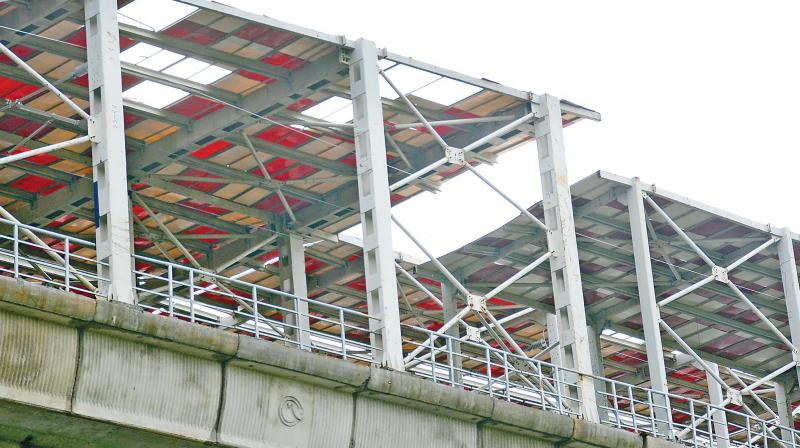Water enters OMR houses, IT offices damaged after effect of cyclone Vardah

Chennai: The plush Rajiv Gandhi Salai in Chennai, popularly known as OMR, was one of the worst-hit areas battered due to the effect of cyclone Vardah. The OMR, which houses majority of the IT majors, wore a deserted look on Tuesday as people living in slums were literally on the roads as their huts were washed away in the rains that lashed the metropolis through Monday.
Rain water entered the houses in several localities in Perungudi, Thoraipakkam and Shollinganallur forcing residents to evacuate to safety as glass and windows panes in high-rise buildings and apartments flew thick and fast. While affordable few moved to hotels, which had 24/7-power backup and uninterrupted water supply to escape the nature's fury, those living in slums were virtually on the roads without knowing where to go.
Those working in IT companies had a tough time staying indoors as ghastly winds broke glass panes and window panes in higher floors of their buildings. Sridhar, who works with a UK-based IT solutions company, told Deccan Chronicle that they had to move from their office on the 7th floor to the ground floor as floors beyond seventh were worst-hit by the winds.
“The canteen on the 9th floor blew completely due to the impact of the cyclone. We had to move down to lower floors as our management thought it was not safe to be on higher floors. And since power was discontinued, we had to climb down stairs to reach to safety,” Mr Sridhar said.
Majority of the IT companies remained closed on Monday and Tuesday as situation did not get better. “We have asked our employees to report to work on Wednesday. But if the situation remains grim, we will take a call on Wednesday morning,” a senior employee of an IT firm said.
Rainwater from the road entered interior lanes, as stones connecting the service road were broken. K. Nethra Raghuraman, a resident of Sri Vidya Avenue in Thoraipakkam, said, “Water over one feet reached our residence on Monday afternoon. As normal life was affected due to no power and water, we checked into a hotel.”
The lively economic hub wore a deserted look with shops being shut and power not being restored for the second consecutive day. “It is an irony that the network in an IT corridor went down. With ATMs going dry, the concept of going cashless is widely questioned,” said C. Pushpa.
Balaji, who runs a hostel in Sholinganallur, said the locality is even deprived of water. “We are out of power since the wind has damaged the electric lines and poles badly. Though we are able to manage to provide food for the inmates since we always have stocks backup,” Mr Balaji said.
He said the cyclone had hit the business of people like him badly. The lack of power has made people to buy water for basic necessities as motors couldn't be operated to fill their tanks up from bore wells.
Lingesh, an engineering student who stays at Kelambakkam in an apartment with his friends, had to shift to a safer place as water began to evade around his place. “We are out of power, and people are telling that it would take two days for the power to be back,” says the distressed student who has his semester exams on.
“The swipe machines were not working in most of the shops which made it difficult for getting basic needs,” said Gowtham, an IT professional.
(With inputs from R Shibi Nandan)
Traffic signal network to be restored in a week
ATMs continue to be offline. Banks have not been functioning for four consecutive days. But restaurants and food joints in the cyclone-ravaged Chennai city and suburbs refused to accept card payments and insisted on "valid currency" from its customers citing non-availability of network.
Demonetisation drive by the Union Government only added to the woes of Chennaiites as the much hyped "go cashless" campaign seemed to have fallen flat with even well established restaurants prominently displaying "Cards Not Working" boards, leaving many go hungry.
Even supermarkets, which were crowded as people queued up to stock up groceries and buy essentials, refused to accept cards citing "poor network" or "no network access".
While hungry citizens blamed the hotel management for refusing to accept card payments, those running restaurants washed their hands off the issue, saying they would readily accept cashless transactions if the network works fine.

